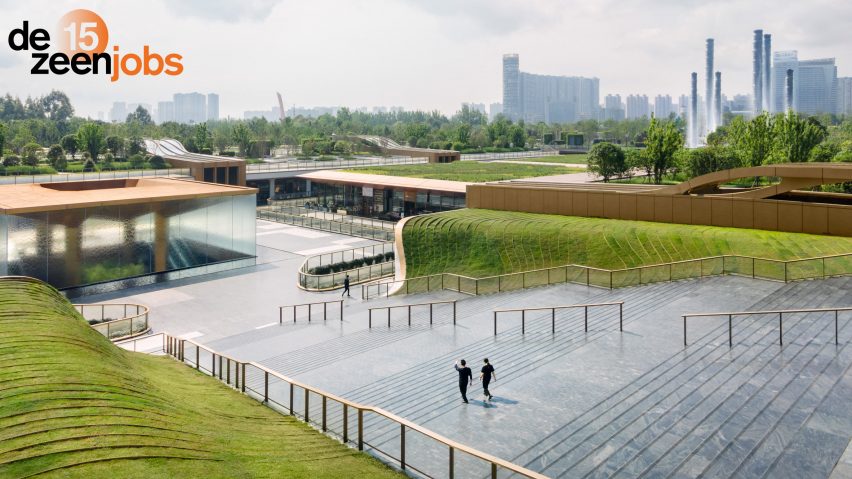In the next part of our Dezeen Jobs: How We Recruit series, we spoke to Sybarite's chief operating officer Natasha Manzaroli about the role that she believes AI will have in future recruitment processes.
Alice Laycock: Please talk me through the type of projects the studio works on.
Natasha Manzaroli: We have delivered close to 3000 projects since 2002 from fashion monobrands, malls and department stores to mixed-use masterplans. Our niche specialism is retail, hospitality and lifestyle. We focus on innovation and collaboration to deliver these projects.
Alice Laycock: What are you currently working on?
Natasha Manzaroli: We are working on monobrands, malls, department stores and masterplans globally but with a special focus on Asia and the Middle East.
Alice Laycock: Where do you currently stand on recruitment in comparison to 10 years ago?
Natasha Manzaroli: Sybarite has had steady and organic growth over the past 10 years. Comparatively, in 2013 we had a much smaller team, and we had less visibility, with a smaller built portfolio and recruitment was based on an as-needed basis.
We now have a recruitment panel and are continuously reviewing CVs and interviewing in search of talented designers, architects, and interior and digital designers.
We are also much more focused on skills-based hiring, assessing candidates against requirements and on their abilities and potential to add value.
Over the past 10 years, we have placed greater emphasis throughout the recruitment process on diversity and inclusivity to ensure that Sybarite is a truly global melting pot of creativity, which we are extremely proud of.
Alice Laycock: Has there been a particular impact on a certain type of job? If so, why?
Natasha Manzaroli: We specialise in luxury retail, lifestyle and hospitality, which have fortunately not demonstrated significant downturns – even during the pandemic, we continued to hire, unlike many other UK companies that were making redundancies. During 2023 we have grown our team by 60 per cent.
As architectural visualisation has become more sophisticated, digital and rendering specialists have become crucial. We have had a growing requirement for BIM specialists with the adoption of Revit on projects.
Also, with an increased focus on sustainability and environmental responsibilities, architects and designers specialising in sustainable design are a growing prerequisite for our staff.
Alice Laycock: What new skill sets are you looking for candidates to have?
Natasha Manzaroli: We are primarily seeking candidates with a combination of creative thinking and a strong awareness of technical challenges and project realisation, but we also highly value proficiency in our core software – Rhino, Revit and AutoCAD.
We require strong communication skills to convey our ideas effectively to team members, clients and consultants. Accurate written, verbal and visual communication skills are all important.
We are an international studio and as such it is important for our team to have cultural and social awareness.
Alice Laycock: Are you looking for candidates with traditional routes to the position, or what kind of additional experience are you looking for? What would catch your eye in an application?
Natasha Manzaroli: We primarily look for candidates who exhibit quality work in their portfolios, emphasising precision and attention to detail in their graphics, passion for design and the willingness to experiment.
However, it is not just about the portfolio, it is about the person, their individuality, interests, passions, and what drives them to be designers – their very own USPs.
Alice Laycock: If a candidate were to come from a different discipline, what would you need them to gain experience in before they got the role? How multidisciplinary are your team at the moment?
Natasha Manzaroli: If a candidate comes from a different discipline, a good 'can-do' attitude, and a willingness to learn our software and work processes are essential. Our team is highly multidisciplinary, consisting of architects, designers, graphic designers, visualisers and branding experts, so having diverse viewpoints is crucial to our practice – it's a core value that enriches our projects.
Alice Laycock: In the last five to ten years, what impact has technology/AI had on your recruitment process?
Natasha Manzaroli: We certainly seek candidates with expertise in new technologies. We rely on the knowledge and skills of new hires to help us grow and stay at the forefront of technological advancements in our industry.
Alice Laycock: Looking into the future, where do you see recruitment heading?
Natasha Manzaroli: I think the initial stages of recruitment will become more automated through AI advancement, with AI playing a more significant role in candidate assessment and selection in terms of suitability for the role.
I am sure the advancement in algorithms will eventually be able to match the candidate with the practice and predict the likely success. This will likely reduce the time spent in the end-to-end process so the studio can focus on the personable and human aspects of recruitment.
Alice Laycock: How has Dezeen Jobs helped build your company?
Natasha Manzaroli: Dezeen intrinsically understands our business and the business of design and architecture and is the perfect match for our needs.
Alice Laycock: Please can you tell me your go-to resources for recruitment?
Natasha Manzaroli: Advertising, our own digital channels, internal word of mouth and recommendation and recruitment agencies.
Find out more about Sybarite by visiting its website.
View current and future vacancies by checking their company profile on Dezeen Jobs.
Dezeen Jobs: How We Recruit series
This article is part of Dezeen Jobs: How We Recruit, a series of interviews to mark Dezeen Jobs turning 15, which explores changing hiring practices and future recruitment needs for companies around the world.

